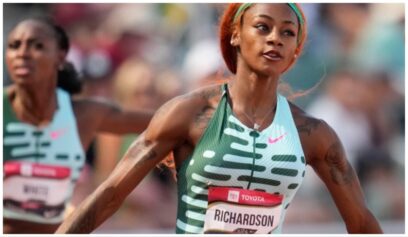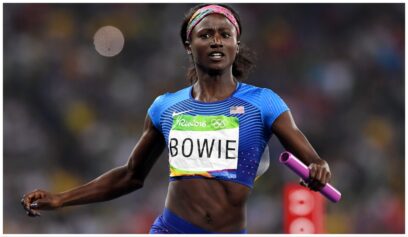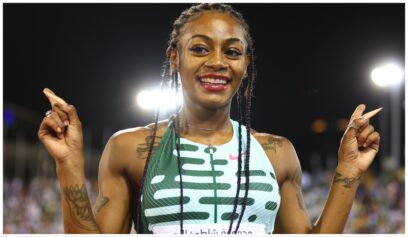On August 17th, 2016, at the Rio Olympic Games — the night of the women’s 100-meter hurdles final — the podium sweep was so enchanted with #BlackGirlMagic that many American track and field fans gazed upon their stars with absolute wonder.
That night, Brianna Rollins, Nia Ali and Kristi Castlin flew across the finish line to clinch gold, silver and bronze for Team USA. They were the first female athletes to ever sweep the event for their country. Photos of the trio went viral. Picture this: Rollins, Ali and Castlin in a joyful embrace; the three of them leaping gleefully with American flags. It was a Kodak moment glowing with Black excellence.
What the cameras didn’t catch, however, was the one legend who helped set the stage for these women 32 years ago: The Olympian who sat along the homestretch, watching the race with excitement and vicarious anticipation.
Her name was Benita Fitzgerald-Mosley. She was the first African American woman to win Olympic gold in the 100-meter hurdles back in 1984.
After the race, Fitzgerald-Mosley got to see Castlin and give her a warm, prideful hug, a symbol of one generation fanning the torch of the other.
Fitzgerald-Mosley, now 58, will be the first to tell you that that 1984 medal, and the confidence that she developed to earn it, has opened many doors for herself and allowed her to blaze new paths for the communities she serves today.
The Smoke Beneath Her Feet
Fitzgerald-Mosley can recall the weeks leading up to 1984 Los Angeles Summer Games like it was yesterday.
Six weeks prior, while she was training at the University of Tennessee, she made one decision that would change her life.
“I remember having an epiphany on the track that I was good enough to earn the gold medal,” she told the Shadow League.
Even though Fitzgerald-Mosley was a 15-time All-American and 4-time NCAA champion, she had never fully embodied her potential as an Olympic gold medalist up until that day.
“It was really the first time I’d really gone into a competition feeling that way,” she said. “I just decided to go into each heat like that gold medal belongs to me. I feel like it took the pressure off a little bit for me to have that expectation and not be unclear about what my mission was.”
Feb 28: Benita Fitzgerald is a all time fav in the DMV who broke Virginia records..has a street and a school named after her in Woodbridge pic.twitter.com/fAzetitj80
— Dani Kwest™️ (@OnnaKwest) March 1, 2017
At the Los Angeles Memorial Coliseum, she blew away the competition in each preliminary heat, winning both round one and the semi-final heat. In the championship race, her rival, Shirley Strong of Great Britain, made the final as well, igniting the flame of revenge inside of Fitzgerald-Mosley.
“The year before at the World Championships she had beaten me and after the race she started smoking a cigarette,” said Fitzgerald-Mosley. “I had vowed that she would never beat me again.”
She was so determined, not even a bad start could break her resolve. She caught up to the Strong mid-race and in a blink they were neck and neck, reaching for the finish line. Fitzgerald-Mosley clocked in at 12.84, only .04 faster than Strong, and made history as the first African American woman to hold the title.
Since then, Fitzgerald-Mosley has taken her gold medal-winning mentality to give back to the sports community that gave her the platform.
After she retired, she worked as the marketing program director for the Atlanta Olympic Committee, and then moved on to direct all four of the U.S. Olympic training centers. From 2009 to 2013, she worked with USA Track and Field as their chief of sport performance. She was the one responsible for organizing all of the support the team received before, during and after competition. Whether it was transportation, medical support, payments, team communication or scheduling, Fitzgerald-Mosley oversaw the plans that got athletes to the starting line, ready to take on anything.
So when Fitzgerald-Mosley was sitting in those stands at Rio in 2016, watching Rollins, Ali and Castlin shine, she was actually watching the results of the tracks she laid long ago.
“It was kind of difficult to be sitting on the sideline and not have any control over the puppet strings, you know?” said Fitzgerald-Mosley. “But I could see the imprint of the plan we’ve put together in 2009. And I had done a plan they had executed flawlessly to help win all of those medals [in 2016]. I got nice emails from my colleagues about how well it came out for the team. I felt kind of proud.”
She’s now the CEO of Laureus USA, a grant-making nonprofit that supports youth sport for development programs in underserved communities across the U.S.
Given all that she’s accomplished, it could be easy to assume that she’s always been a confident person.
But Fitzgerald-Mosley says that she struggled to appreciate herself ever since she was a young girl.
The Power of Sport in Building the Youth
Benita grew up in the suburbs of Dale City, Virginia, where she and her sister were some of the few people of color at her school. While she said skin color wasn’t the main root of her insecurity, Fitzgerald-Mosley remembered how tough it was to navigate social situations at that age.
“I tend to be pretty shy and a bit introverted,” said Fitzgerald-Mosley. “When I was in middle school and elementary school, I had a low self-esteem. I was having the typical challenges around friendships and fitting in.”
She struggled despite being a star student who participated in numerous extra-curricular activities- Gymnastics, softball, Majorettes, violin, flute and piccolo lessons. It wasn’t until she found track in 7th grade that she started finding her groove.
From @USOlympic – Benita Fitzgerald Mosley: Setting Sights On Gold: http://t.co/pTQETKyl05 pic.twitter.com/o4ZB3TzDpv
— USATF (@usatf) August 10, 2014
“I was doing hurdles, the sprints, relay and high jump,” said Fitzgerald-Mosley. “I started winning right away. Being better at something than most of my peers and getting positive feedback from my friends and my community went a long way. I started to rise above [any social challenges] because it was okay if some people didn’t like me. I was enjoying myself. By the time I got to high school, that shy little girl was gone.”
As Fitzgerald-Mosley continues to do her work for Laureus, she remembers her 12-year-old self and the young lives her organization supports everyday. She believes sport (as well as other physical activities such as yoga and dance) is not just great for boosting kids’ confidence; it’ss capable of transforming entire communities.
“When you marry a kid’s passion for sport or physical activity with a caring coach teaching them life skills, helping them improve their education and employment outcomes, it’s a really successful thing,” said Fitzgerald-Mosley. “In the programs that we are involved with [the kids] graduate high school at twice the rate of their peers and they are half as likely to get involved with the criminal justice system.”
One Laureus-sponsored organization, The ELEVATE Leadership Program (ELP) of New Orleans, provides a great example of this, she adds. ELP is an after-school basketball enrichment program that provides student-athletes with tutoring, financial and nutritional literacy programs, hot meals and ACT/SAT prep.
New Orleans’ high school graduation rates are steadily improving, rising from 54% in 2004 to 78% in 2018, according to the Louisiana Department of Education. ELP, which Fitzgerald-Mosley claims has a 100% graduation rate, has been an important player in the city’s educational reform.
“It’s really huge,” she said.
Fitzgerald-Mosley also pointed out that physical activity, as compared to other activities such as art and academics, can have an even greater impact on the health of a community. Laureus claims that of kids who participate in their sponsored programs, 82 percent reported improved physical health while 81 percent reported improved social-emotional health.
“The physical and mental health aspect of movement can’t be underestimated,” said Fitzgerald-Mosley. “It can’t be duplicated when you’re sitting in a chair playing an instrument or drawing. We don’t just fund traditional ‘balls and bats’ programs. We fund a few dance programs in Harlem and a few yoga programs. It is definitely a huge differentiator to have kids moving.”
In America, where millions are affected by chronic disease and obesity, Laureus’ data suggests that these programs centered on physical activity could potentially have the power to change the future health of the country.
Using Fashion To Raise Awareness
Of course, Fitzgerald-Mosley’s job isn’t always solely focused on the heavy task of solving the world’s issues. There’s plenty of room for lightness and creativity.
In 2018, she got a chance to organize Laureus’ inaugural “Sport for Good Fashion Show”. During Fashion Week in New York City, the organization invited 20 professional athletes to walk the runway in order to raise funds to support disadvantaged youth. Renowned sports celebrities like Olympic fencer Ibtihaj Muhammad and NFL MVP Marcus Allen strutted under the spotlights, wearing designer threads. Kristi Castlin, the hurdle queen, wowed the crowd with fine jewelry, while X Games legend Tony Hawk made a playful entrance by skating down the catwalk.
“It was a lot of fun, and we’re expecting to have the same amount of fun [this year],” said Fitzgerald-Mosley.
This year’s fashion show gala will take place on Tuesday, Sept. 10th at the Mercedes-Benz Manhattan Dealership. The model lineup is packed with all-stars: former NFL player Jesse Palmer, five-time Olympic gold medalist Nadia Comaneci, Super Bowl champion Malcolm Mitchell, four-time Olympic gold medalist Sanya Richards-Ross, NBA all-star Dwight Howard and more.
These are all athletes who recognize that their success on the field can mean more than hanging a shiny prize around their necks.
https://www.instagram.com/p/BnrVJkxHPmm/
“I always say that my gold medal is the gift that keeps on giving,” said Fitzgerald-Mosley. “I just want to pay it forward to other kids and women, in particular, to be able to fulfill their dreams.”
That gold medal may not be the jewelry she’ll be rocking on that runway, but it will certainly be there in spirit, guiding the energy of the night.
The Laureus Good for Sport Fashion Show tickets are now available. Click here to grab your spot or to simply donate.



